Taoism
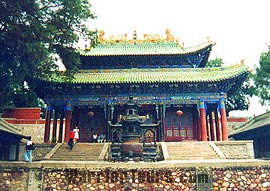
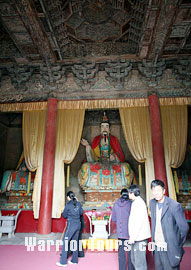 Originally Taoism was one philosophy school of dozens schools instead of a religion in the Spring and Autumn period. The most famous and outstanding thinkers and philosophers of Taoism are Laozi, more commonly spelled as Laotzu or Laotse in the West, and Zhuang Zi, more commonly known as Chuang Tzu. They were important figures in the development of philosophical Taoism and seemed no intention to found the religious Taoism. Laotzu was named Li Er, or Lao Dan, and once kept records for the Zhou Dynasty (11th --- 221 BC). Legend says he had such amazing wisdom that even Confucius visited him. He faded into the history without even his precise birth time left after he finished his famous book, 5,000 characters only, Tao Te Jing (The Book of the Way of Power or Classic of the Way and Its Power), which later became Taoist bible. Later, Chuang Tzu developed Taoism theory further and left another Taoist canon named with his own name - Chuang Tzu (The Book of Chuang Tzu). However, Taoism was not a religion before the Han Dynasty (206 BC --- 220 AD). It debuted as a religion in the late East Han Dynasty (25 --- 220), and soon split into different sects. Later Taoism was overwhelmed by Buddhism in the competition with the latter. In the Tang, Song, Yuan, Ming dynasties, Taoism boomed due to the imperial support. In the middle Qing Dynasty (1644 --- 1911), Taoism lost imperial support and waned. However, it still has many followers in the country.
Originally Taoism was one philosophy school of dozens schools instead of a religion in the Spring and Autumn period. The most famous and outstanding thinkers and philosophers of Taoism are Laozi, more commonly spelled as Laotzu or Laotse in the West, and Zhuang Zi, more commonly known as Chuang Tzu. They were important figures in the development of philosophical Taoism and seemed no intention to found the religious Taoism. Laotzu was named Li Er, or Lao Dan, and once kept records for the Zhou Dynasty (11th --- 221 BC). Legend says he had such amazing wisdom that even Confucius visited him. He faded into the history without even his precise birth time left after he finished his famous book, 5,000 characters only, Tao Te Jing (The Book of the Way of Power or Classic of the Way and Its Power), which later became Taoist bible. Later, Chuang Tzu developed Taoism theory further and left another Taoist canon named with his own name - Chuang Tzu (The Book of Chuang Tzu). However, Taoism was not a religion before the Han Dynasty (206 BC --- 220 AD). It debuted as a religion in the late East Han Dynasty (25 --- 220), and soon split into different sects. Later Taoism was overwhelmed by Buddhism in the competition with the latter. In the Tang, Song, Yuan, Ming dynasties, Taoism boomed due to the imperial support. In the middle Qing Dynasty (1644 --- 1911), Taoism lost imperial support and waned. However, it still has many followers in the country.
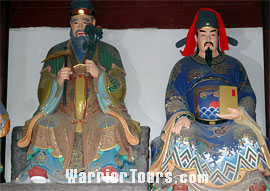
![]() What is Taoism
What is Taoism
Taoism is hard to understand, however, it tells many truths and shows wisdom.
At the center of Taoism is the concept of Tao, which is the natural order of things and cannot be explained since it exceeds senses, thoughts and imagination. It needs more meditation and contemplation and can be known only through mystical intuition. Literally Tao means 'the path' or 'the way'. Tao is the natural way of the universe, the driving power in nature, the order behind all life and the driving force behind all living things. It underlies everything and works beyond human logic. Taoists believe Tao is the origin of the universe and creates all living beings, thus they worship all life in the universe and everything else created by nature, thereby worship nature. Taoism encourages cooperating with nature and natural forces instead of against them. The Taoist teaching Wuwei (Non-action) tries persuading people not to try to control nature, to conform with it instead. Taoists realize that nature is constantly in transformation and change and its order and harmony are more stable.
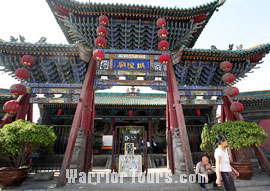
Taoism also claimed people can be physically immortal. Taoists engaged in alchemy long ago to produce Elixirs of Immortality. There were two sects of alchemists. The Outer alchemists believed in herbal medicine and pharmacology. The Inner alchemists believed in alchemy inside their bodies with energy, qi and spirit. As a result, Chinese medical science and Taoism helped each other all the way.
Taoism mainly preaches Wuwei (Non-action). The concept does not mean to do nothing as it literally suggests. It means to follow the flow of nature and let everything be what it naturally will be, not trying against it to satisfy nature. The concept was Taoist living attitude and utopian governing method (to govern lightly, with least visibility and a serving attitude, not to take actions involving the people).
Taoism also advocates Wuyu (Non-intention), which requires people not to desire too much from life. Simplicity, compassion, moderation and humility are also Taoist teachings.
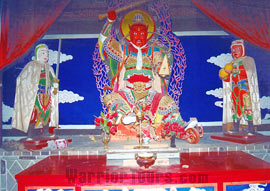
![]() System of Taoism Deities
System of Taoism Deities
As many religions in the world, Taoism has a strict bureaucracy in Taoist pantheon. Taoist highest gods are the trinity San Qing (Three Pure Gods). The three gods are respectively respected as Yu Qing (Jade Pure), Shang Qing (Upper Pure) and Tai Qing (Great Pure).
Among the three, Tai Qing (Great Pure) is said to be the immortalized and divinized Laotzu and superior to the other two. Under the trinity gods, there are four Heavenly Emperors respected as Yu Huang (Jade Emperor) who governs other deities, and the other three who help him.
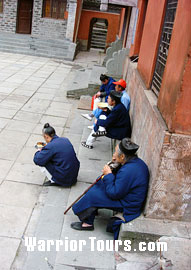 Next there are four numina guarding the east, the west, the south and the north respectively. Among them, the northern numen is entitled Zhenwu (Genuine Prowess), colloquially Zhenwudadi, and usually enjoys more respects than other superior gods, since legend says he is the eighty-second reincarnation of Tai Shang Lao Jun (another divinized title of Laotzu). There are also other heavenly spirits, such as the famous Ba Xian (Eight Immortals) and San Guan (Three Officials). Although the complicated Taoist deity system is puzzling, one can figure it out according to its rank system and Taoism beliefs.
Next there are four numina guarding the east, the west, the south and the north respectively. Among them, the northern numen is entitled Zhenwu (Genuine Prowess), colloquially Zhenwudadi, and usually enjoys more respects than other superior gods, since legend says he is the eighty-second reincarnation of Tai Shang Lao Jun (another divinized title of Laotzu). There are also other heavenly spirits, such as the famous Ba Xian (Eight Immortals) and San Guan (Three Officials). Although the complicated Taoist deity system is puzzling, one can figure it out according to its rank system and Taoism beliefs.
Famous Taoist Holy Mountains: Mt. Huashan, Mt. Hengshan (in Hunan), Mt. Hengshan (in Shanxi), Mt. Laoshan, Mt. Longhushan, Mt. Maoshan, Mt. Qingchengshan, Mt. Songshan, Mt. Tai, Mt. Wuyi, Mt. Wudang, Mt.Qiyun, etc.
Famous Taoist Holy Temples: Baiyun (White Cloud) Temple in Beijing, Baxian (Eight Immortals) Temple in Shaanxi, Daoyuan (Taoist Temple) in Shangdong, Louguan Terrace in Shaanxi, Zixiao (Purple Heaven) Temple on Mt. Wudang in Hubei, Qingyang Palace in Chengdu, etc.

